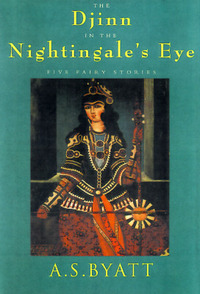You need to sign in or sign up before continuing.
Take a photo of a barcode or cover
The Glass Coffin - 3.5*
Gode's Story - 3*
The Story of the Eldest Princess - 5*
Dragon's Breath - 4.5*
The Djinn in the Nightingale's Eye - 4*
The Story of the Eldest Princess
"'You are a born storyteller,' said the old lady. 'You had the sense to see you were caught in a story, and the sense to see that you could change it to another one. And the special wisdom to recognize that you are under a curse - which is also a blessing - which makes the story more interesting to you than the things that make it up.'"
"'But you listened to the Cockroach and stepped aside and came here, where we collect stories and spin stories and mend what we can and investigate what we can't, ad live quietly without striving to change the world. We have no story of our own here, we are free, as old women are free, who don't have to worry about princes or kingdoms, but dance alone and take an interest in the creatures.'"
Dragon's Breath
"The villagers' life in the forest became monotonous, boring even, since boredom is possible for human beings in patches of tedium between exertion and terror."
"And these tales, made from those people's wonder at their own survival, become in time, charms against boredom for their children and grandchildren, riddling hints of the true relations between peace and beauty and terror."
The Djinn in the Nightingale's Eye
"there was a woman who was largely irrelevant, and therefore happy."
"She was a merely a narratologis, a being of secondary order, whose days were spent hunched in great libraries scrying, interpreting, decoding the fairy-tales of childhood (...)."
"A live match was live, was a story in progress towards an end which had not yet come but which must, almost certainly come. And in the fact of the almost was the delight."
Gode's Story - 3*
The Story of the Eldest Princess - 5*
Dragon's Breath - 4.5*
The Djinn in the Nightingale's Eye - 4*
The Story of the Eldest Princess
"'You are a born storyteller,' said the old lady. 'You had the sense to see you were caught in a story, and the sense to see that you could change it to another one. And the special wisdom to recognize that you are under a curse - which is also a blessing - which makes the story more interesting to you than the things that make it up.'"
"'But you listened to the Cockroach and stepped aside and came here, where we collect stories and spin stories and mend what we can and investigate what we can't, ad live quietly without striving to change the world. We have no story of our own here, we are free, as old women are free, who don't have to worry about princes or kingdoms, but dance alone and take an interest in the creatures.'"
Dragon's Breath
"The villagers' life in the forest became monotonous, boring even, since boredom is possible for human beings in patches of tedium between exertion and terror."
"And these tales, made from those people's wonder at their own survival, become in time, charms against boredom for their children and grandchildren, riddling hints of the true relations between peace and beauty and terror."
The Djinn in the Nightingale's Eye
"there was a woman who was largely irrelevant, and therefore happy."
"She was a merely a narratologis, a being of secondary order, whose days were spent hunched in great libraries scrying, interpreting, decoding the fairy-tales of childhood (...)."
"A live match was live, was a story in progress towards an end which had not yet come but which must, almost certainly come. And in the fact of the almost was the delight."
4 shorts then a (very, in comparison) long. As an eldest sister (of 3 sisters), I was partial to "The Eldest Sister", and "Dragon's Breath" reminded me of nothing so much as an allegory of the rise of Nazism (or really any terrible thing that seems to come out of nowhere and then for awhile is everywhere). The first two stories didn't do much for me but perhaps that's because they were still mentally buried from years ago when I read Possession. As for the title story, I can see why others find it dry. I personally enjoy stories of scholars being erudite, but it sure took its sweet time to get off the ground. All a part of the fascinating layering of stories within stories within stories, yet a little editing down here and there might have amplified the layering effect where instead it felt meandering and a bit bogged down.
A collection fairy tale short stories from one of my favorite writers. I liked some of the stories more than others.
I liked the first three short stories; thought they were wonderful little fairy tales. The other two, though, weren't all that great. Byatt's writing is a bit long for me.
Lovely tales, a modern Aesop's Fables with a distinct near east twist. I read the whole thing in one sitting, a pleasant easy read.
More beautiful, magical tales by A.S. Byatt. The title story gives a modern look at the three wishes bestowed on a British woman by a genie (djinn) in a bottle of Turkish nightingale glass.
Grāmata, kuras titulstāsts kalpojis par iedvesmu filmai “Three Thousand Years of Longing” - tas šajā krājumā arī ir garākais un krāšņākais. Vēl mani ļoti aizķēra stāsts par trīs princesēm un to, ka iepriekšnolemtība dažreiz varbūt arī absolūti atbrīvojoša - ja rezultāts ir neizbēgams, tad ceļu uz to var izvēlēties jebkādu un atteikties no vajadzības visu darīt pareizi vai tā, kā tas no tevis tiek sagaidīts. Pārējās trīs pasakas bija dažādā mērā dīvainas, un īpaši negribas pieminēt :)
“Daži cilvēki laikam gūst ārkārtīgu prieku, lemjot citu cilvēku likteņus. Varbūt tā rodas ilūzija, ka viņi ir noteicēji arī pār savu likteni...”
“Pasakās tās vēlmes, kas nav ļaunas vai vērstas uz destrukciju, parasti noved pie skaista miera stāvokļa, kas atgādina drīzāk mākslas darbu nekā Likteņa drāmu. It kā laimīgais cilvēks no putekļaina ceļa būtu nonācis nemainīgi skaistā dabas klēpī, kur valda mūžīgs pavasaris un nepūš skarbi vēji.”
“Ir lietas, kas guļ zemē, cilvēka roku darinātas lietas, un ir cilvēka roku neveidotas būtnes, kas dzīvo savu, no mūsējās atšķirīgu dzīvi, kas dzīvo ilgāk par mums un mūsu dzīvē reizēm ienāk ar pasakām, ar sapņiem, ienāk brīžos, kad lidojam svabadi.”
“Daži cilvēki laikam gūst ārkārtīgu prieku, lemjot citu cilvēku likteņus. Varbūt tā rodas ilūzija, ka viņi ir noteicēji arī pār savu likteni...”
“Pasakās tās vēlmes, kas nav ļaunas vai vērstas uz destrukciju, parasti noved pie skaista miera stāvokļa, kas atgādina drīzāk mākslas darbu nekā Likteņa drāmu. It kā laimīgais cilvēks no putekļaina ceļa būtu nonācis nemainīgi skaistā dabas klēpī, kur valda mūžīgs pavasaris un nepūš skarbi vēji.”
“Ir lietas, kas guļ zemē, cilvēka roku darinātas lietas, un ir cilvēka roku neveidotas būtnes, kas dzīvo savu, no mūsējās atšķirīgu dzīvi, kas dzīvo ilgāk par mums un mūsu dzīvē reizēm ienāk ar pasakām, ar sapņiem, ienāk brīžos, kad lidojam svabadi.”
adventurous
emotional
reflective
medium-paced
Plot or Character Driven:
A mix
Strong character development:
Yes
Loveable characters:
Complicated
Diverse cast of characters:
Yes
Flaws of characters a main focus:
Yes
Ahhhhh. Big happy sigh. What a wonderful & enchanting little book. Simply delightful.
dark
emotional








